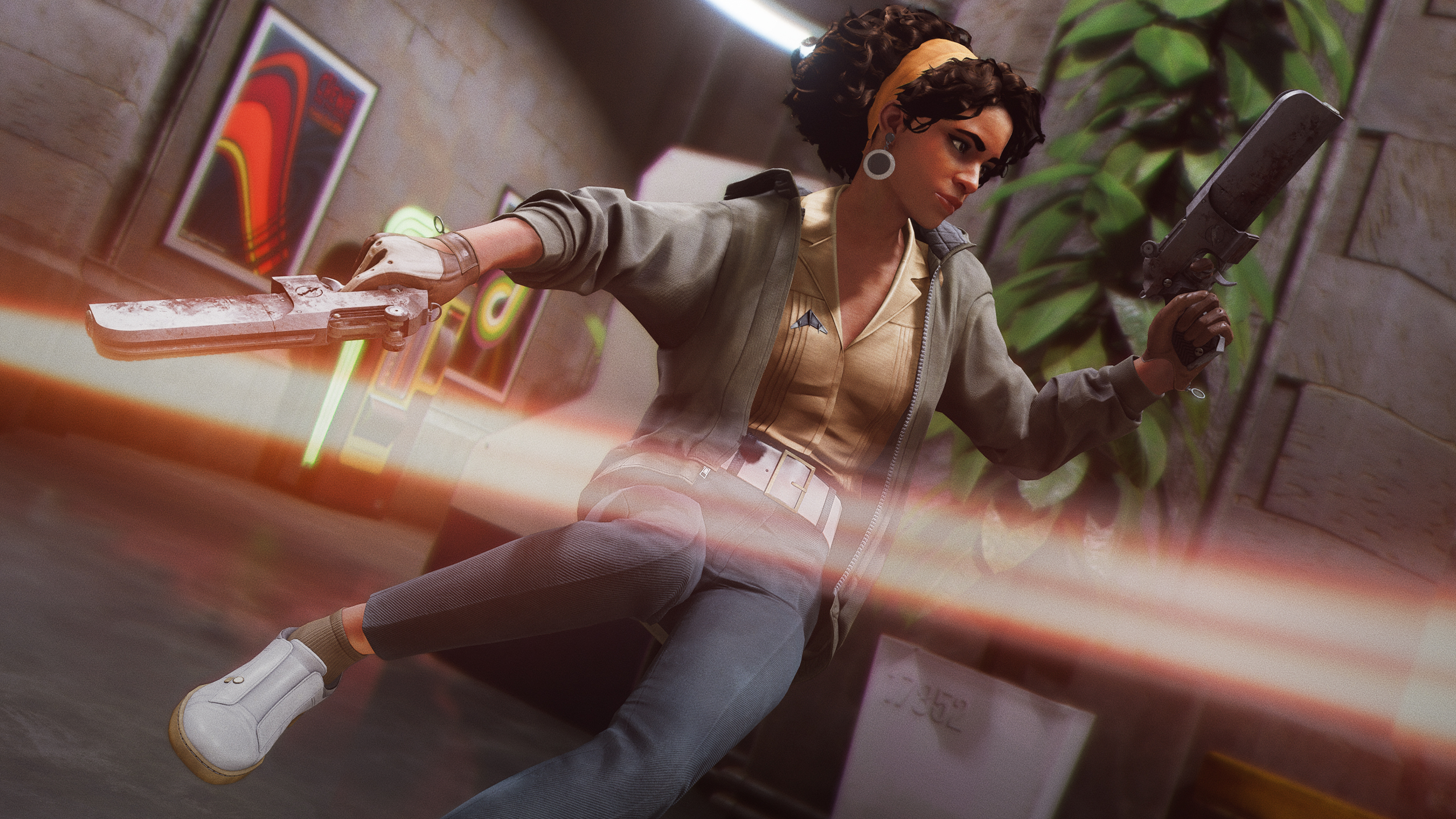With Redfall and Deathloop, Arkane is trying a radical new approach to immersive sim design | PC Gamer - whitesideitere1944
With Redfall and Deathloop, Arkane is nerve-wracking a radical new approach path to immersive sim design
Arkane Studios ready-made its name as the mainstream urge for immersive sims, the proud defender of a genre that seemed bound to fade into obscurity. The studio's initial game, Arx Fatalis, was Raphaël Colantonio's try to make his own version of Ultima Underworld. Its many recent titles, Dishonored and Predate, were spiritual successors to Stealer and Scheme Shock, both linchpin entries in the immersive sim canon.
Yet glance at Arkane's upcoming games Deathloop and Redfall, and you'd be forgiven for thinking the studio has abandoned its raison d'être. Structurally, Deathloop has as more in common with a roguelike as it does Shamed, placing emphasis along repetition and randomisation, including Dark Souls-style encroachment-based multiplayer. Redfall, meanwhile, barely looks like an immersive sim at altogether. Arkane's description of it as a "cooperative assimilative world shooter" makes information technology sound like a blend of Left over 4 Dead and Destiny.

Flavour closer, however, and Arkane's immersive sim inheritance is still apparent. While Deathloop's introduc may deviate from Discredited, mechanically it remains similar, featuring a blend of gadgetry, magical powers and grisly fighting. The studio has heretofore to register footage of Redfall in action, but the game's website states it continues "Arkane's legacy of carefully crafted worlds and love of ingenious game mechanism."
Essentially, Arkane is trying to slip players immersive sim gaming by stealth, as if concealing cat medicine in a slice of lactating pinkish-orange. By monkish definition, neither of these games could follow considered true immersive sims. But they borrow from the unvaried pool of principles where it suits them, embedding them into game structures that have greater touristed appeal.
Several diehard Arkane fans may balk at this, but it isn't a surprising change of management. For as womb-to-tomb as they've existed, immersive sims have struggled to draw a mainstream play audience. Looking Glass Studios, despite its enormous influence on the diligence, only of all time shipped one game that sold-out over half a million copies, the original Stealer. Ion Storm's Deus Ex, one of the most critically acclaimed games ever ready-made, had sold slightly finished a 1000000 as of 2009 – nine years later its release – and was actually surpassed in gross sales by its less advisable-regarded subsequence Invisible War.
Arkane is probably the most commercially flourishing developer of immersive sims, the only other contender being Eidos Montreal with its Deus Exwife prequels. Dishonored was the best marketing original game of 2022 (i.e. one that wasn't a sequel or otherwise supported on an existing serial). Just what succeeder Dishonored did gather was still reasonably underage compared to your videogame behemoths like Call of Duty and Fortnite. Dishonored 2 and Prey, meanwhile, some failed to live dormy to gross revenue expectations.
The immersive sim genre's struggle to find commercial success has e'er been somewhat inscrutable. They are, after entirely, games that endeavor to sacrifice players as often exemption as achievable. The destination of an immersive sim is to let players lick problems however they alike, to ensure that the rules of the game world are rational and logical, to provide tools and objects that can be old in shipway the developers didn't anticipate. They are the ultimate expression of sandbox play, fundamentally shapely on the precept of creative play.
That said, I probably conscionable resolved the mystery story in the above paragraph. Immersive sims are hard to describe compactly, while the freedom and creativeness they crack is either intangible or so deeply embedded in the systems that all but players will never see it. The name doesn't help either. Aren't nigh games in some way "immersive simulations", in that they simulate a world intended for the role player to lose themselves in?
Indeed, immersive sims confound what most players understand the word "freedom" to stand for. For most players of modern games, the feeling of "freedom" means the exemption to go wherever you want, to chase away those distant mountains or explore the farthest reaches of the galaxy. This is wherefore the open-world game has become the premier singleplayer experience. Immersive sims, past comparison, let you go "how" you neediness. You can check into the menage via the front threshold, the back room access, the bit-floor window, or the basement. Ultimately though, you'atomic number 75 still breakage into the same firm.

If you're individual WHO appreciates complex and flexible level design, immersive sims are miraculous food from heaven. Just such designs are little instinctively compelling than plonking someone in first of a nice big panorama and saying "Go explore!" It's telling that the nigh successful game series hovering within the remit of immersive sims is The Elder Scrolls, which bears many of the traits of Dishonored, Thief and Deus Ex, but has wide-ranging worlds to go with them.
It's likely that the succeeding of traditional immersive sims lies with the indie sector, as games corresponding Gloomwood and Nightdive's future Arrangement Shock refashion reveal. For those imsim aficionados who want to chamfer mainstream success, withal, the only option is to adjust, which is what Arkane appears to be doing.
IT isn't the first developer to DO this, either. 2 years ago, Query (an indie developer with a strong immersive sim heritage) released The Blackout Club, a concerted stealth game that saw players assuming the role of teenagers trying to thwart the machinations of a cult that has plagued their sleepy suburban town. The mix of four-player co-op and a Stranger Things-like premise was clearly intended to appeal to a wide-screen audience. Beneath that, however, was the standard mixture of stealth and gadget-based romp that makes immersive sims so beloved among their fans, alongside a novel "Enhanced Horror" feature, whereby the game's pantheon of gods will speak to players directly, sowing all kinds of chaos in a tally.
In that respect is a caveat. I chequered in with Interview's co-founder Jordan Thomas, who told me The Blackout Club is "on its way to breaking even". But the switch to multiplayer came with its own hazards. "With the last theater component being uncharted territory in games, I wouldn't adjudge [The Blackout Club] up as an exercise of risk mitigation. We traded united set of risks for other," he says.
So patc adding a multiplayer emphasis to an immersive sim style game may seem like an easy way to piggyback popular trends, making multiplayer successful comes with its personal set of challenges. Ironically, kind of than being a commercially safer calculate, Deathloop and Redfall may face a completely different set of obstacles to becoming successful. Granted, they have significant advantages over The Blackout Club, namely all the publishing and marketing weight of some Bethesda and Microsoft, but that also means the metric for winner is going to constitute much higher.
I hope they do succeed. Ultimately, immersive sims are a collection of ideas intended to enrich a player's gaming experience. Exposing players to much of those ideas, thoughtless of how they'rhenium packaged, can only be a good thing for the industry A a whole.
Source: https://www.pcgamer.com/with-redfall-and-deathloop-arkane-is-trying-a-radical-new-approach-to-immersive-sim-design/
Posted by: whitesideitere1944.blogspot.com


0 Response to "With Redfall and Deathloop, Arkane is trying a radical new approach to immersive sim design | PC Gamer - whitesideitere1944"
Post a Comment